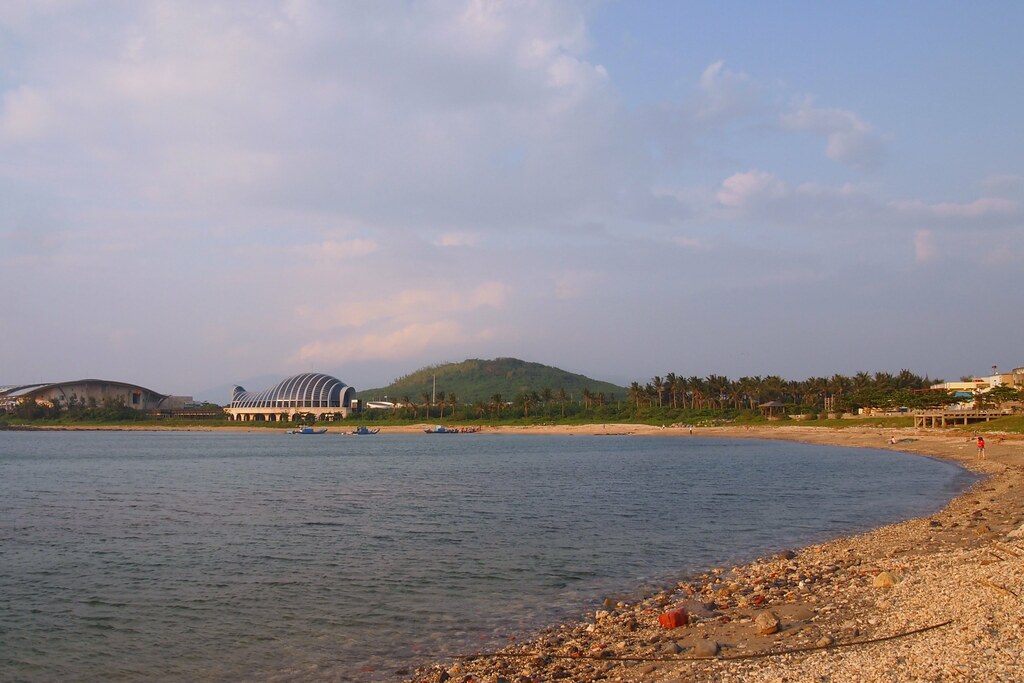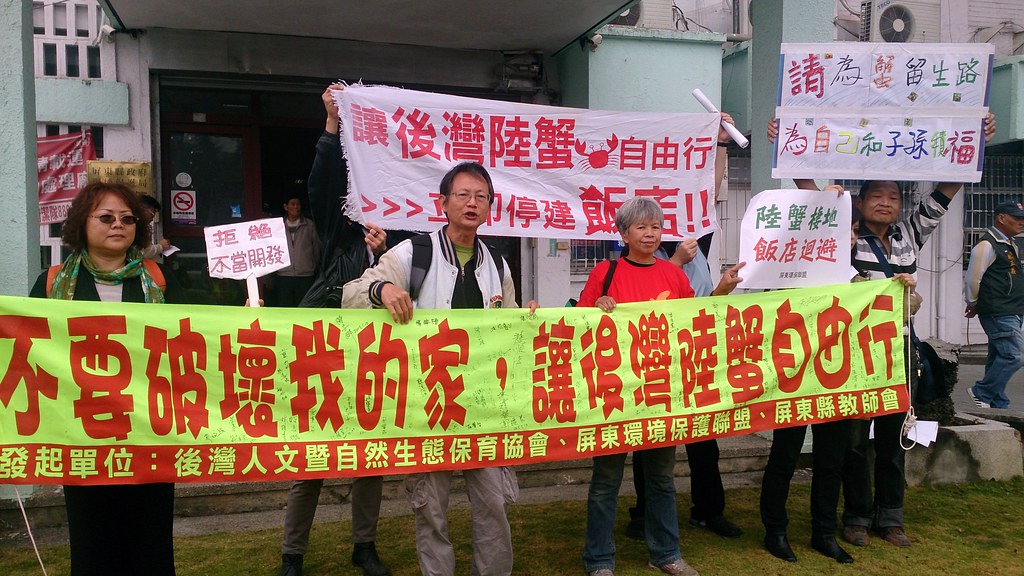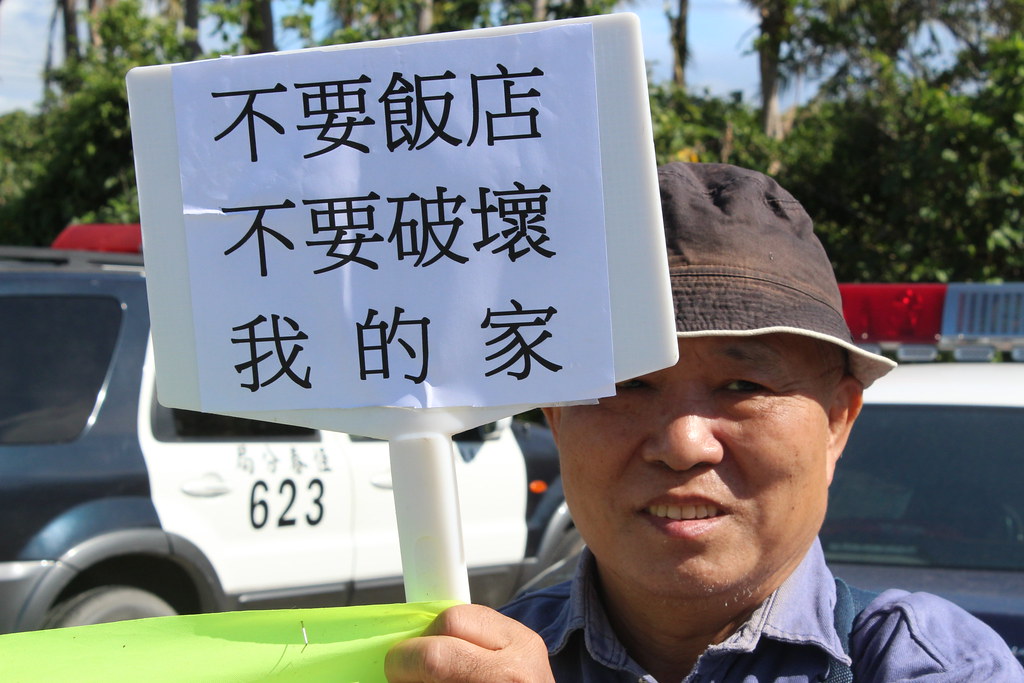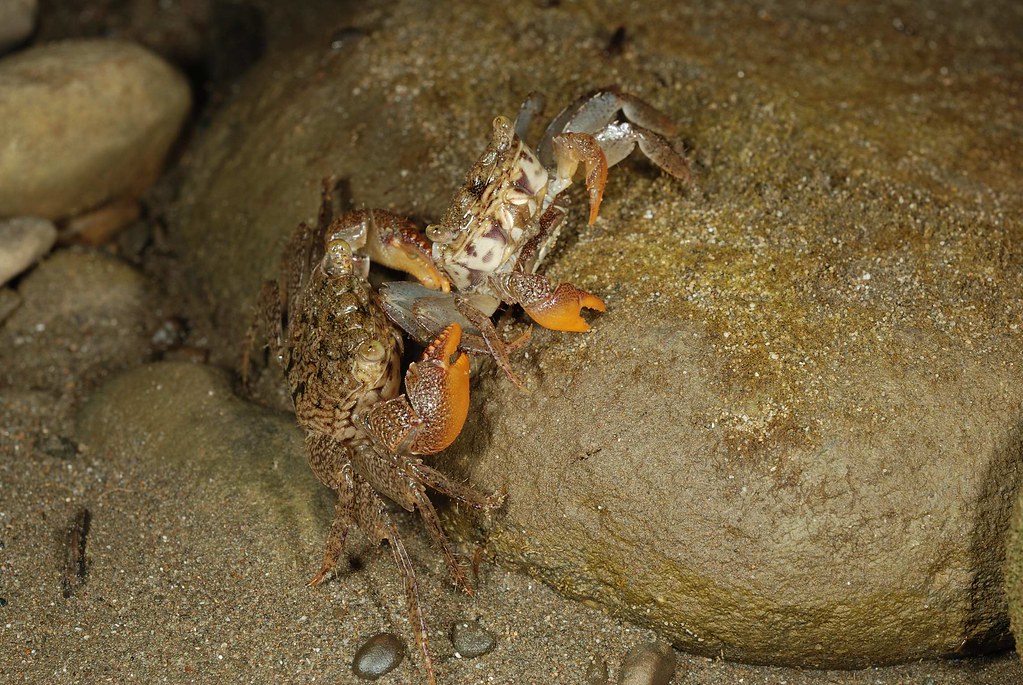Pingtung, Taiwan, June 28, 2018 (TEIA)– A decade-long debate on a development project within a valuable land crabs' habitat in Kenting National Park's (墾丁國家公園) Houwan Bay (後灣) has concluded. Executive Yuan has finalized the deal on swapping land ownership, specifically the exchange of government-owned land parcel for private-owned land parcel. In this land swap deal, the government offers the parking lot next to National Museum of Marine Biology and Aquarium to the developer, King's Town Construction Co. (京棧飯店). This allows them to construct their hotel and also protect the precious land crabs' habitat.
This first-ever land swap deal is a notable milestone in Taiwan's habitat conservation history. From lobbies among governments, industries, and grassroot groups to an absolute consensus among them, this conservation resolution has laid the foundations for a sustainable future for the land crabs in the National Park.

The idea of land swap was initiated by grassroot environmental groups. Hung Hui-Hsiang (洪輝祥), the former chairperson of the Pingtung Environmental Protection Union (屏東縣環境保護聯盟), who has been striving to conserve Houwan Bay's land crabs for more than eleven years, shared that the developer was seeking to develop a hotel within the national park when they discovered a large population of land crabs that should be protected. Fortunately, Kenting National Park Administration Office was open to a land swap, and this resulted in a triple-win situation with the conservation of the land crabs, sustenance of the natural resources, and respecting the developer's rights.
Conservation Comes Before Economic Development Led a Long-term Debate
In 2006, the King's Town Construction Co. acquired a land parcel next to the Aquarium in Houwan to build a hotel. While clearing and preparing the land parcel for development, a large number of land crabs were unexpectedly found dead on site. This incident led to a campaign to protect land crabs. Following in 2009, Taiwan Environmental Protection Administration (Taiwan EPA) issued a conditional approval as the project's environmental impact assessment outcome - the development will be suspended if the land crabs population falls below 50%. In addition, the Administration Office amended the planning of the development and the Construction and Planning Agency's National Construction Park Committee reviewed future administrative work.
Later in 2014, the King's Town Construction Co. submitted its revised hotel construction plan to Pingtung County Environmental Protection Bureau for environmental impact comparative analysis review. This was iteratively reviewed by the environmental groups and conservationists, who placed great emphasis on the importance of the land crabs' habitat in Houwan Bay. However, the government would not prioritize conservation nor order the developer to withdraw this development project.

The deadlock ended when both Pingtung County Environmental Protection Bureau Director Lu Tai-ying (魯台營) and Kenting National Park Administration Office Director Liu Pei-tung (劉培東) agreed to accept the land swap proposed by the grassroots organizations and commence negotiations with the developers. After a two-year long administrative procedure, Taiwan's first-ever land swap for conservation was completed.
Hung commended the outcome, “after an eleven-year long effort, we finally succeeded in convincing the developer to accept the resolution and to agree that development does not come first. This wise choice will allow us to further coordinate sustainable projects for land crab conservation.”
Citizens Urge the Government to Prioritize Conservation
Hung also emphasized the pivotal role that citizen participation played in this successful campaign to preserve the Houwan Bay land crabs' habitat. Citizen awareness was raised through engagement in environmental impact assessment meetings, holding on-site visits, and organizing e-petitions. He noted that it is this public attention which pushed the government away from the developers' lobby, “it is because of pressure from the citizens who urged the government to prioritize conservation that the government's position no longer leans toward that of the developers.”
Local resident Yang Mei-yun (楊美雲), a committed long-term conservationist and eco-tourism promoter in Houwan, commended “the land swap is a win-win resolution for everyone.”

When Yang and other conservationists first discovered the Houwan Bay land crab habitat and started the campaign, they were met with many misunderstandings and criticisms from the local residents. They were condemned for impeding the development of the hotel and Houwan Bay's tourist economy. Today, however, the local residents are proud to have accomplished such a significant conservation for Taiwan through the land swap.
"When we first launched the environmental initiative, we hoped that public awareness would be raised. We must educate residents on their rights", said Yang. "Any change will require a significant amount of time, but we must persevere to let everyone know where the problems are.”
Land Crabs Are More than a Tourist Attraction
Yang pointed out that conserving the land crab habitat is synonymous with conserving Houwan Bay's tourist economy . “We must first protect our environment in order to secure our profits from tourism” she said.
But the value of the land crabs is more than their economic return, as Yang discussed in further detail. A land crab habitat functions as an important component in the ecosystem because when land crabs release their larvae in the intertidal zone, they are fueling the entire biological community of coastal wetlands. This fuel is the reason behind the abundance of natural resources in coastal habitats, which provides a myriad of economic benefits in terms of attracting tourists, and serves as an important buffer zone for natural disasters.
She emphasized that nature has suffered great degrees of anthropogenic pollution and degradation and if we as human beings cannot protect our environment, we will ultimately be the ones to suffer.
Preserving Land Crabs' Gene Pool Remains Challenging Even with Designating a Conservation Area
The Administration Office states that the land crab habitat will be slated as a conservation area after the land swap is completed. They will work with the local community to manage it. In this regard, Yang believes that a more prudent assessment should be conducted and communicated. "The community needs to be educated to change their mindsets. More importantly, the maintenance of this habitat needs to be led by specialists. Hence the Administration Office should not pass on this responsibility to the local community.”
Houwan Bay's land crab habitat is precious in that it not defragmented by roads. Yang hopes that conservation can be prioritized in Houwan, and ecotourism from the nearby beach should not disturb the forested areas and the land crab habitat. According to Yang, ecotourism will benefit the community.

Alternatively, Hung Hui-Hsiang firmly believes that Houwan Bay is the gene bank of Taiwan's land crabs. Houwan Bay has up to 27 different species of land crabs and high-density populations. After declaring it as a conservation area, he recommends to continue active conservation so that the land crabs can reproduce well.
Kenting National Park has more than 30,000 hectares of land and over 100 kilometers of coastline. The coastline in Kenting should be land crab friendly. Specially, after adult land crabs have released their larvae into the sea, they should be able to return safely to their terrestrial habitats. Conservation and rehabilitation for land crab hotspots should be strengthened, especially in Banana Bay (香蕉灣) and Gangkou River Estuary (港口溪). We must protect and restore the once rich but now declining land crab population in Kenting, thereby making the National Park a better environment and healthier ecosystem.
After the eleven-year-long lobbying effort on development in Houwan Bay's land crab habitat, we have finally reached achieved a significant milestone in Taiwan's conservation history. Hung Hui-Hsiang recognizes the efforts from the public sector that made the land swap possible beyond their jurisdiction, and for optimising the balance between conservation value and the interests of the development project.


